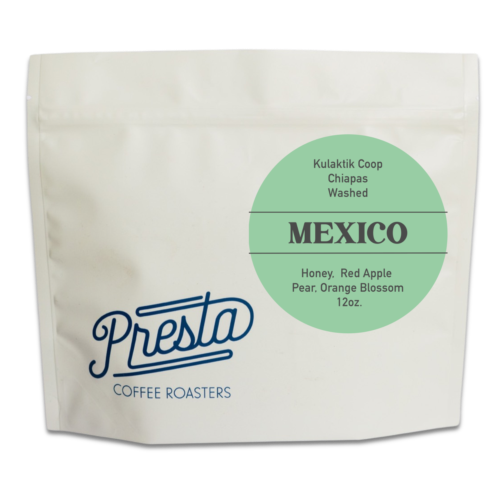
Mexico - Kulaktik Co-Op - Chiapas - Washed
Origin: Mexico
Region: Chiapas
Farmers: 150 Smallholder Farmers
Elevation: 1100-1500 MASL
Processing: At Farm
Varietal: Typica, Bourbon, Caturra
Processing Method: Washed
Tasting Notes: Honey, Red Apple, Pear, Orange Blossom
This coffee comes to us from a co-op consisting of around 150 members in the Chiapas state of Mexico, which borders Guatemala. Each smallholder farmer maintains Fair Trade and Organic certifications; and grows, harvests, and processes the coffee (at their farm) before sending it to the co-op facilities for the final stages of grading before it is exported. The majority of the farmers are indigenous Tzeltal (Mayan) people who have historically occupied the Chiapas highlands and still speak the language today. The name of the co-op "Kulaktik" means "Vine" in the native Tzeltal language.
The washed process is when the coffee cherries have the skin, fruit mucilage, and parchment layer removed shortly after picking. The cherries are initially sent through a de-pulper to remove the skin and majority of the mucilage before being soaked (technically fermentation) in large tanks to loosen the mucilage that remains attached. The beans are then flushed with water to rinse them clean. The drying can be done in a few different ways, large industrial dryers for faster drying in more humid, less sunny places, or more often, on large concrete pads, or raised beds where the coffee needs to be turned by hand to ensure consistent drying. Finally the beans are sent through a dry mill to remove the final protective layer around them, known as the parchment layer. Once the parchment is removed the beans are ready for sorting and grading.
Being based in Tucson we are always looking for coffee from our neighbors to the south, in Mexico, even though the coffee growing region there is as far south as you can go (near the equator). We picked this coffee after tasting the floral sweetness of the Honey and Orange Blossom, with the depth and complexity that come from having many farms growing a few different varietals sold as the same lot.
